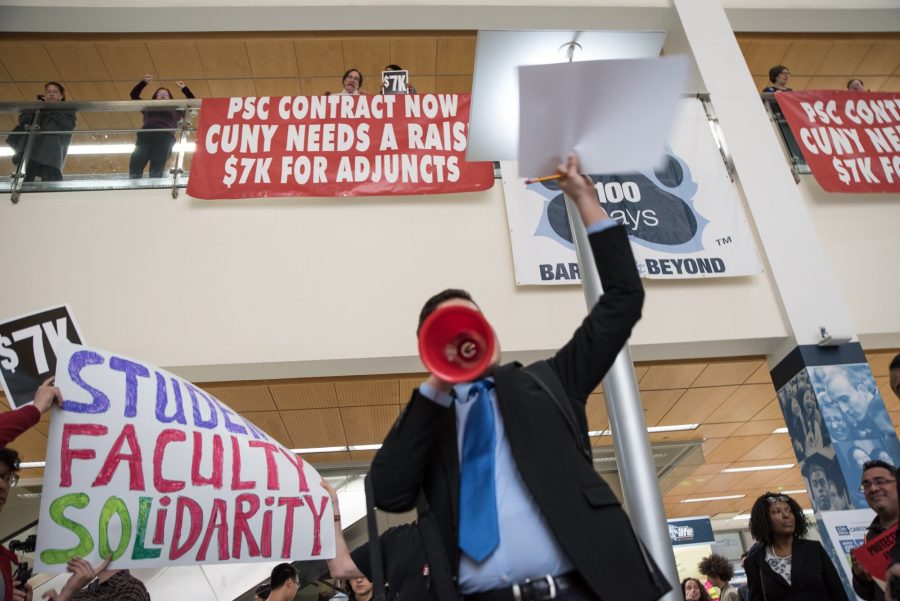PSC and CUNY ratify new contract benefitting adjuncts
December 9, 2019
The Professional Staff Congress and CUNY 2017-2023 contract was ratified on Nov. 27 with a total of 13,660 PSC member votes for the proposal. Out of 21,416 eligible voters, 15,976 people voted, creating a high voter turnout of 75%. Of these votes, 13,660 supported the proposal — 86% of votes — and 2,316 did not.
The Delegate Assembly approved the contract before PSC members voted on it, with 200 “yes” votes counter 20 “no” votes.
The new contract includes a pay raise for adjunct professors among many other provisions, such as back-pay for as far back as 2017 to make up the difference with the new salaries.
It will raise adjunct, or part-time, professors’ salaries for three credit courses up to $4,469 from the current $3,222 and a $5,586 salary increase for four credit courses. These salaries are per course per semester, according to a previous article from The Ticker.
Additionally, there will be the opportunity for pay increases of about 10% across the board until the year 2022. Overall, the contract will increase salaries up to 71%, according to the PSC press release about the ratification.
“Congratulations, PSC members! My thanks to every member who voted and everyone who participated in a spirit of solidarity during the union-wide discussion about the contract and ratification. The high turnout and high percentage of ‘yes’ votes shows that the PSC membership is engaged with the union and in strong support of the contract,” the press release, written by PSC President Barbara Bowen, opened.
The PSC has been rallying for a salary of $7,000 for CUNY adjuncts for a while now, with slogans like “7k or Strike” or “Fight for 7k” circulating CUNY campuses. While the newly ratified contract doesn’t give adjunct professors a salary of $7,000 per course, it is a significant increase from their previous pay.
Though, while the congress as an organization is calling the 2017-2023 contract a win, there are some union members who are displeased with the agreement, saying that it’s not what they were fighting for and that the PSC should have kept pushing.
“While the PSC leadership is enthusiastically promoting this proposed agreement as a victory, its salary gains remain far below the original bargaining demands,” an article from LaborNotes.org about the contract before it had been ratified. “Rather than moving us forward to fight another day, this contract would set us back by leading politicians and the public to believe that the adjunct problem has been solved.”
“The union’s bargaining team insists that this is the best they could do in the current climate, but rank-and-file activists see how the union demobilized the membership instead of injecting resources into building power in the workplace and solidarity on the streets. We know the union can do better,” the article continued.
The article went on to encourage PSC members not to support the contract and to vote “no” on its ratification. While there were over 2,000 no votes on the contract, this countermovement was not as persuasive as its creators might have hoped.
As the contract is now ratified and passed, it will begin to take effect now, and will include retroactive pay increases for classes taught between Dec. 1, 2017 and now.
Other provisions included in the new contract that will also begin to take effect are paid office hours for every course an adjunct teaches, graduate employee health insurance funding and tuition waivers expanded and a joint PSC and CUNY anti-bullying campaign for students.
Contractual travel funds for professors will be doubled. Reaction to the contract’s ratification was mixed, with PSC leadership naming it a historic victory for professors, while other groups aren’t pleased.
“PSC executives led a disinformation campaign (paid for with dues), buying ads and directing staffers to get out a yes vote on a contract that was, in reality, nowhere near historic,” an article about the contract from CUNYStruggle.org said.
“Our union’s leadership attempted to stifle discussion by shortening the voting window, censoring social media discussion, and ignoring rank-and-file demands for more contract town halls and meetings. They shrugged off the material needs of the most exploited members, and spread fear about the outcome of a no vote. Despite all this, we succeeded in creating online and face-to-face spaces for horizontal rank and file mobilization. This was truly historic,” the article went on to say.
“We knew this would be a tough battle, and we knew that many members would choose to ratify the contract simply because they felt disarmed, demobilized, and continually bombarded by leadership with the false notion that this contract was ‘the best we could do,’” the post, signed 7k or Strike, said.
On the other side, supporters of the contract explain that it’s only the first step in a longer process.
“Let’s build on the momentum of the hard-fought contract campaign and the big voter turnout to tackle the hardest issues that still confront faculty, staff and students at CUNY,” Bowen wrote in the PSC press release.
“The new contract originated in a vision of what New York City’s public university should be, and it takes us a few steps closer to making the vision real. We have many steps to go. Let’s take them together,” he continued.








